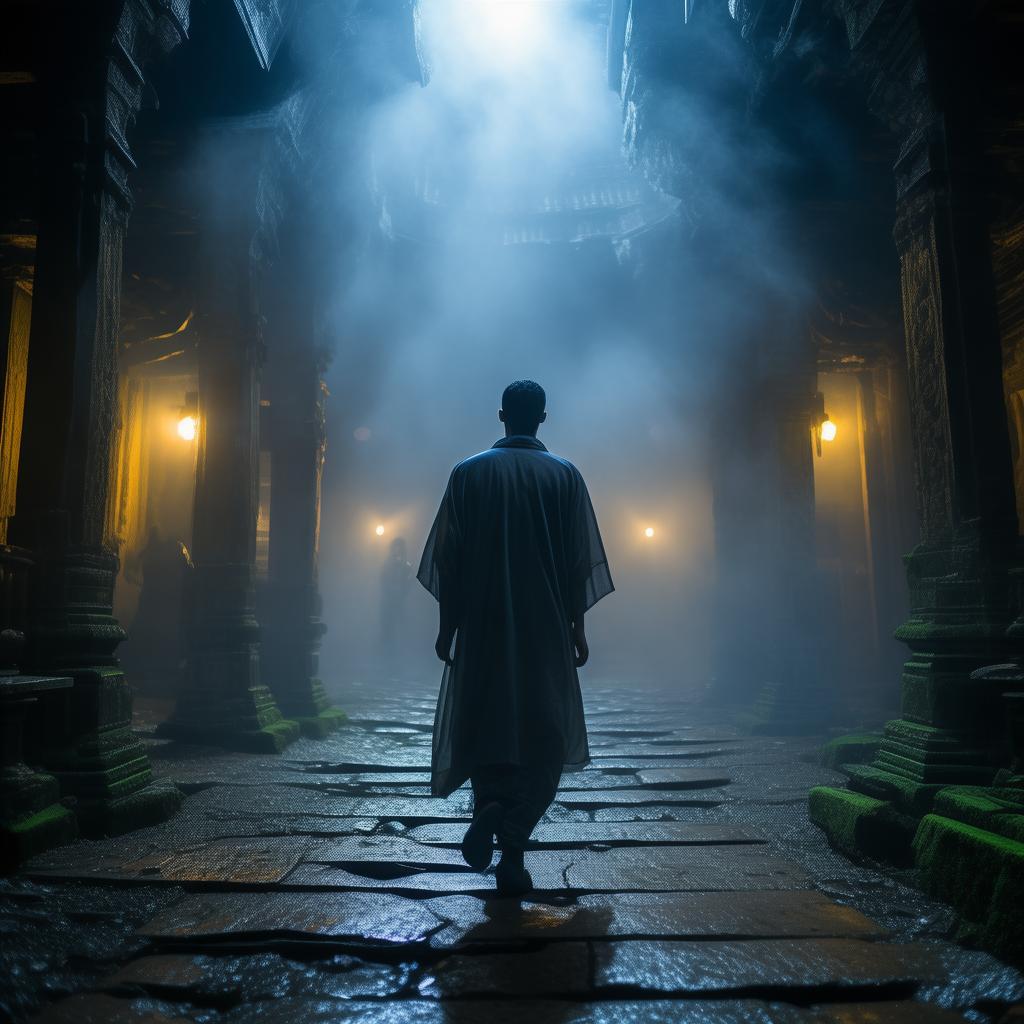The Bamboo Enigma: The Muzi Shop's Haunted Awakening
The quaint village of Jinglong was nestled between rolling hills and ancient bamboo groves, its cobblestone streets echoing with the distant laughter of children and the occasional honk of a bicycle bell. The village was a place of secrets, its history as enigmatic as the bamboo that grew in its shadow. Among the cobblestones, there stood a shop that had been forgotten by time, its signboard, long rotted, hanging loosely from its hinges like a ghost's cloak.
The shop was known as the Muzi Shop, a name whispered in hushed tones by the villagers. It was said that the shop was built upon the site of an old temple, where ancient spirits still roamed. The villagers avoided the shop, its windows perpetually dark, as if it were a cave of shadows waiting to consume the unwary.
One rainy afternoon, a young woman named Mei arrived in Jinglong. She was a curious soul, drawn to the village's legends and the allure of the forgotten Muzi Shop. Mei, with her bright eyes and adventurous spirit, took a chance and rented the shop, hoping to uncover its secrets.
The shop was as eerie as Mei had imagined. The air was thick with the scent of damp earth and old wood, and the walls seemed to pulse with an unseen energy. Mei spent her days sorting through the shop's contents, which ranged from dusty antiques to peculiar trinkets with no discernible purpose.
One evening, as Mei was cleaning a dusty shelf, she noticed a peculiar bamboo pole, intricately carved with symbols that seemed to dance in the flickering candlelight. Intrigued, she reached out to touch the bamboo, and as her fingers brushed against it, a sudden chill ran down her spine.
Mei felt a strange connection to the bamboo, as if it were calling to her. She decided to take the bamboo with her, placing it in a small corner of the shop. As the days passed, Mei found herself drawn to the bamboo, often finding herself gazing at it in the dead of night.
One night, as Mei sat by the bamboo, she felt a strange sensation, as if the bamboo were whispering to her. She leaned closer, and to her astonishment, the bamboo began to glow with an eerie light. The symbols on the bamboo seemed to come to life, forming words that Mei could barely make out.
"Secrets," the bamboo seemed to say, "are hidden within."
Mei's heart raced. Could the bamboo be a key to the Muzi Shop's past? She spent the next few nights poring over the bamboo, deciphering its cryptic messages. Slowly, she began to piece together the story of the Muzi Shop.
It turned out that the shop was indeed built upon the site of an old temple, a place of great power and mystery. The temple had been destroyed centuries ago, but its spirits had not been entirely banished. The bamboo was a remnant of the temple, a conduit to the world of the dead.
As Mei delved deeper into the shop's history, she began to experience strange occurrences. Objects would move on their own, and she would hear faint whispers in the night. Mei realized that the spirits of the temple were awakening, drawn to the bamboo and the life it brought to the Muzi Shop.
One night, as Mei was lying in bed, she heard a knock at the door. She opened it to find an old woman, her eyes hollow and her face etched with sorrow. The woman spoke in a voice that seemed to come from everywhere and nowhere.
"Child," she said, "you have woken the spirits of the temple. They seek to be remembered, to be heard."

Mei was frightened, but she felt a strange sense of responsibility. She knew that she had to help the spirits find peace, to bridge the gap between the living and the dead.
Over the next few weeks, Mei worked tirelessly to communicate with the spirits. She learned to speak their language, a language of shadows and whispers. She learned to listen to their stories, to understand their pain and loss.
As Mei's bond with the spirits grew, the Muzi Shop transformed. The air became lighter, the shadows less oppressive. Mei began to see the spirits, ethereal figures that moved with grace and purpose. They were no longer trapped in the world of the dead, but were now able to interact with the living.
One evening, as Mei was closing the shop, she felt a presence behind her. She turned to see the old woman, her eyes filled with gratitude.
"You have done well, child," she said. "You have brought peace to the spirits of the temple."
Mei smiled, feeling a sense of fulfillment she had never known before. She knew that her journey was far from over, but she was ready to face whatever challenges lay ahead.
The Muzi Shop's Haunted Awakening had changed Jinglong forever. The village was no longer a place of fear, but a place of wonder and understanding. Mei had become a bridge between the living and the dead, a guardian of the temple's secrets.
And so, the Muzi Shop stood, a beacon of light in the darkness, its bamboo pole glowing with the promise of peace and hope.
✨ Original Statement ✨
All articles published on this website (including but not limited to text, images, videos, and other content) are original or authorized for reposting and are protected by relevant laws. Without the explicit written permission of this website, no individual or organization may copy, modify, repost, or use the content for commercial purposes.
If you need to quote or cooperate, please contact this site for authorization. We reserve the right to pursue legal responsibility for any unauthorized use.
Hereby declared.









